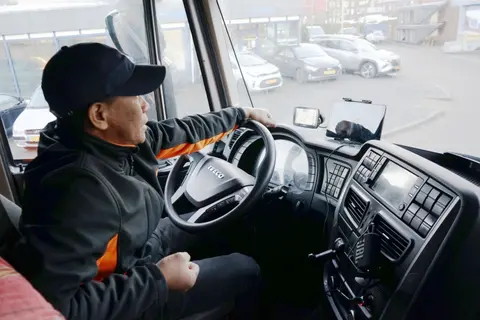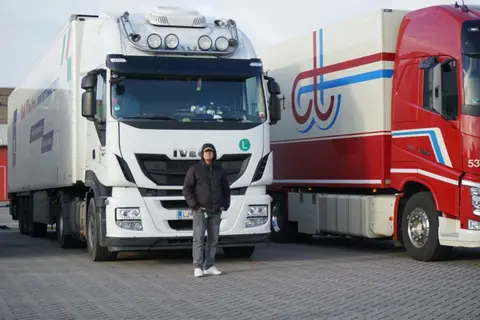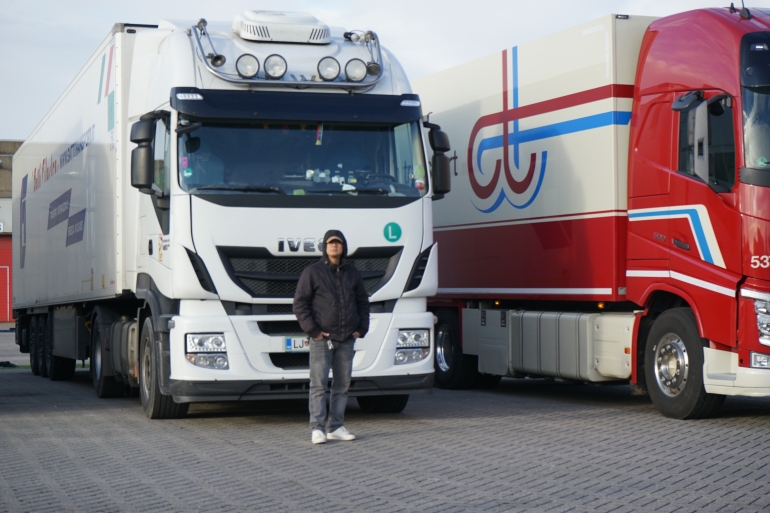
Amsterdam, Netherlands – Randy spent most of 2017 in his truck, zipping from one European border to another.
His employer pushed him to disregard mandated rest times to keep on driving long hours on endless roads. Toilet breaks were taken in parking lot portalets, or portable toilets, and baths were a rare luxury. He was paid lower than what was promised to him.
When one of his colleagues was injured in a road accident in Belgium and taken out of the hospital the next day and forced to drive, Randy and his colleagues decided they had enough.

As a nonprofit journalism organization, we depend on your support to fund more than 170 reporting projects every year on critical global and local issues. Donate any amount today to become a Pulitzer Center Champion and receive exclusive benefits!
Randy and eight other Filipino truck drivers filed a case of human trafficking against their employer, King’s Transport, and its owner, Mustapha, alleging unfair wages, deplorable working conditions and verbal abuse.
Last September, the office of the public prosecutor in the Netherlands ended a three-year investigation and dismissed their complaint, describing their working conditions as “unfortunate and unfavourable” but not human trafficking for the purpose of labour exploitation.
“I feel like we were thrown away, that we weren’t listened to. Like what we went through didn’t mean anything,” said the 51-year-old Randy who asked that only his first name be used.

The case of the nine Filipino truck drivers exposed how easy it is for unscrupulous employers to take advantage of a highly fragmented transport industry bleeding from a shortage of truck drivers and plagued by uneven regulations that undercut wages and subject drivers to abusive working conditions.
Gaps in the Netherland’s legislation leave migrant truck drivers like Randy caught in the middle, with little protection.
“These gentlemen have been kept waiting all this time only to come to this disappointing decision,” said Jereon Maas, the lawyer for the truck drivers.
According to Maas, an appeal has been filed but it will be an uphill battle to prove labour exploitation and the drivers may be compelled to return to the Philippines.
The case prompted parliamentarians to file a motion to broaden the definition of labour exploitation in the Netherlands and make it easier to prosecute worker abuse.
These legislative changes instigate the much-needed reforms in the transport industry but might come too late for Randy.
With the case dismissed, Randy now faces having to go back to the Philippines and the economic hardship that he had tried to escape.
From one bad employer to another
Randy had been dreaming of driving big trucks ever since he taught himself to drive his father’s jeepney as a 10-year-old boy growing up in Leyte, central Philippines.
“I was never really much of a student. But when I was behind the wheel, I felt like I could be something,” said Randy.
Knowing how to work a steering wheel and manoeuver his way around the tight gridlocked streets of Manila would be his ticket to carving out a living. Later, Randy chased higher-paying trucker jobs in Saudi Arabia and Qatar.
In 2015, after five months of working in Qatar, Randy saw a Facebook post about an urgent need for drivers in Europe offering 1,200 euros ($1,350) per month – three times what he was making.
Just about a year earlier, a monstrous typhoon had battered the Philippines, flattening Randy’s home, leaving him with “no job, no house, no life.”
Randy thought about what the pay bump could do for him and his family. He sent a message with little expectation.
Within a month, Randy was in Poland, driving around Switzerland and Germany – European countries he had previously only seen on TV.
When his work contract was about to expire in 2017, Randy became anxious about his job security.
It was around this time when Mustapha, the owner of King’s Transport, recruited him in a parking lot in Rotterdam, the Netherlands, and offered him 1,600 euros ($1,800) if he could start working immediately.
“That was when things got bad. I was driving 19-20 hours to complete deliveries. I lived in my truck and was paid less than what I was owed,” said Randy.
‘Unfavourable, unfortunate’
Al Jazeera reviewed the individual cases where Randy and eight other Filipino drivers recounted the conditions that they were made to work under from 2017 to 2018.
While details varied, the men had similar complaints of using faulty or disabled trackers to bypass mandated rest times and drive long hours, living in their trucks, and being paid less than they were promised.
One complained of verbal abuse. Another complained of being threatened to go to work even after he had a road accident.
The Dutch prosecutor’s office dismissed the case saying there was insufficient evidence for human trafficking because their wages were still above Dutch minimum wage and they still had the option to leave their employer.
“Not everything bad that the employer does against their employees is human trafficking. Human trafficking is very severe and is like slavery. The conditions that the drivers were working under are not slavery conditions,” said Els Martens, the public prosecutor who penned the decisions.
“The drivers had a choice. They had an alternative. They did not like how they were being treated, but they were empowered to stand up for themselves, stop working and file a complaint. This is not exploitation. As a whole, we do not want employers to treat their employees this way, but it is not slavery,” Martens told Al Jazeera.
Labour rights advocates and experts argue that existing laws make it nearly impossible to punish labour abuses.
Labour migrants whose work and residence permits are tied to a particular employer experience a form of entrapment.
What constitutes modern-day slavery becomes hazy and vague when international laws that define the cross-border nature of human trafficking have no corresponding criminal code for prosecution in national laws.
“There is a high threshold for human trafficking that makes it difficult to prosecute. The Dutch criminal code does not have provisions to prosecute less severe forms of exploitation. Employers can get away with so much abuse,” said Masja van Meeteren, professor of criminology at the University of Leiden in the Netherlands, which is undertaking a study to examine the varied forms of labour exploitation.
“When we think of ‘slavery’, we have images of people being locked up. But you don’t have to be locked up to be trapped into working under exploitative labour conditions,” said Eefje de Volder, adviser on labour exploitation for the NGO Coordination Centre for Human Trafficking (CoMensha).
The Netherlands Court of Audit found that the current efforts to tackle labour exploitation do not help victims and allow offenders to get off scot-free.
According to its report, from 2016 to 2019 there were 331 reports of labour exploitation filed, but fewer of them have been handed over for criminal investigation.
In 2016, 27 percent of cases led to a criminal investigation. In 2019, this number dropped to 4 percent.
In contrast, cases of reported labour exploitation in 2020 increased by 70 percent compared with the previous year.
“This is really a sad case where this particular employer has shown that he can threaten workers and underpay workers with impunity. It’s a deadly cocktail for a really bad industry already,” said Edwin Atema from the Federation of Dutch Trade Unions (FNV), which represents truck drivers in the Netherlands.
‘A truck is like a jail’
An estimated three million truck drivers form the backbone of the European economy transporting goods from shipping ports and offloading them to supermarkets and department stores.
They all drive along the same endless roads but disparities in salaries separate them.
A driver hired from low-wage countries in Eastern Europe and the Philippines can be paid as little as 500 euros ($560) doing the same job a Western European driver would be paid an estimated 3,000 euros ($3,380) for.
With the main costs like fuel and truck maintenance being pretty standard for all the transport players, driving down salaries becomes a way to increase profits.
“Exploiting drivers makes for a profitable business case,” said Atema.
In one of the many parking lots that line the highways that stretch from the port of Rotterdam, the largest seaport in Europe, about 40-50 trucks are lined up as drivers take a rest break from hauling anything from vegetables and flowers to aviation parts.
“See this truck is registered in Lithuania,” said Atema, pointing to its license plate. “But you will never see it working there.”
This small detail illustrates how transport companies reduce costs and circumvent labour laws by setting up letterbox companies (PDF) in an European Union member state with lower wages while operating only in countries where wages are higher.
“What you see here are workers working under the indicators of human trafficking. Drivers are jailed in their truck, receive low salaries, and threatened to break the law and continue to working. Some freak out after being isolated in a truck for so long,” said Atema, who worked for more than 10 years as a driver himself before becoming part of the FNV trade union.
On weekends, which drivers are mandated by law to take as rest days, these parking lots are converted into de facto camping sites where truck drivers lay back to cook and wash their clothes.
They clean themselves up in petrol station bathrooms or portalets. At night, they curl into the cabins of their trucks to sleep. When the weekend is over, they pick up and deliver a new load.
“In the EU, there is not a single member state that gives priority to road transport. The Dutch authorities could come here and fine all these individual companies for thousands and thousands of euros. But there is simply no public interest to do so. It is ridiculous,” said Atema.
Hitting the bottom line
Trade unions warn that the shortage of truck drivers is at critical levels with an estimated shortage of 400,000 across the EU.
Companies will increasingly depend on low-wage Eastern European countries for workers.
The coronavirus pandemic brought the trucking crisis to the extreme with COVID checkpoints choking shipping and air cargo distribution lines.
In the United Kingdom, where these factors were further exacerbated by Brexit, the crisis was brought to what was described as “apocalyptic levels” when petrol stations started running out of supplies.
In 2018, around the same time that Randy and his colleagues filed a case against King’s Transport, the Danish police raided a camp at the border of Germany and Denmark after reports that 26 truck drivers, mostly from the Philippines and Sri Lanka, were living in what was described as “slum-like conditions” with no proper heating or toilet facilities.
The high-profile case dragged on for three years. Last year, the Danish court dismissed the case absolving trucking giant Kurt Beier of allegations of human trafficking but fining the company about 17,000 euros ($19,170) for violating Denmark’s building act for housing the drivers in unsafe conditions.
“This is the biggest case of human trafficking that we have seen in Denmark. It is very disappointing that the case will not even be appealed because the court said it will be impossible to prosecute,” said Hans Christian Graversen, international secretary for the Danish trade union 3F.
However, companies are stepping in where courts have fallen short by hitting Kurt Beier where it will hurt the most: its bottom line. Several Danish companies have refused to do business with Kurt Beier.

International forwarding and logistics company Nordic Transport Group (NTG), issued a strongly-worded statement referring to the treatment drivers were subjected to as the reason for terminating its business dealing with the besieged trucking company.
“We have never and will never accept such actions … We have not collaborated with Kurt Beier Transport since, and we will not do so in the future,” it said.
Robert Grandt who has been a truck driver for 37 years welcomed the development.
“It sends a very important signal that companies will not tolerate labour exploitation,” he said.
The 57-year-old Danish national said the undercutting of salaries makes him anxious about being replaced by someone who can do his job for a cheaper salary.
“It undermines the whole system and makes it more difficult for us to negotiate for what is a fair and standard wage in collective bargaining agreements. In the end, people won’t want to work as truck drivers because the pay is too low,” said Grandt.
Uprooted again
In a flat outside central Amsterdam, Julie, one of the Filipino drivers involved in the case against King’s Transport, reflected on the three years that have passed since they filed their case and pinned their hopes on winning it.
“Before this, I’d given up on love. On finding a partner,” said Julie, 46, over dinner with his partner and her young son.
Like Randy, he had spent many of his years as a migrant worker driving in the Middle East. The separation strained his first marriage and his wife went from friend to stranger. The stability of domestic life is something that Julie had always craved.
“You’re driving around a lot, going from one country to another. There are women you meet, chat up and text but being on the road so much and not knowing where you’ll end up, it’s really hard to build something,” Julie said as he peeled a chicken leg into strips for the toddler that he has grown to love as his own.
“They’ve taken away my job. Will they take this away, too?”







